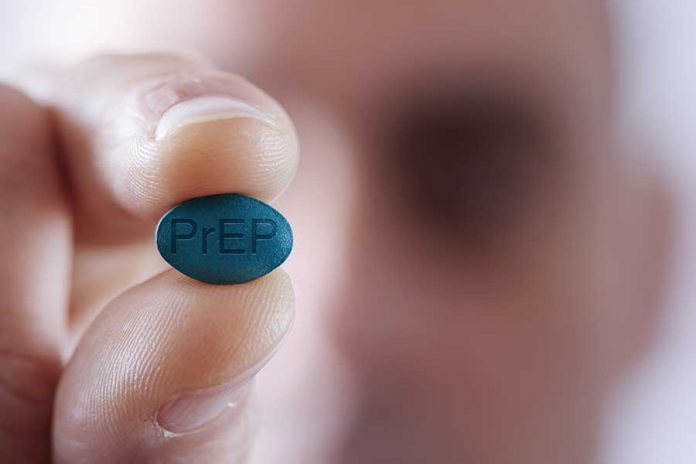Health and Human Services Secretary Alex Azar announced a new nationwide program to provide free HIV-prevention drugs — PrEP — to uninsured Americans at risk of HIV. About 200,000 people will have access to the daily pre-exposure prophylaxis medication through the program, Ready, Set, PrEP. To qualify for the program, participants must test negative for HIV, have a valid prescription for the medication and be without prescription drug coverage.
President Trump, in his State of the Union address in February, announced the goal of ending the HIV epidemic in the next decade. The initiative aims to reduce new HIV infections by 75 percent in the next five years and 90 percent by the end of the decade.
A report from the Centers for Disease Control released on Dec. 3 noted that only one in five people who could benefit from PrEP are getting it. The CDC estimated that 1.2 million people would benefit from a PrEP prescription.
“Ready, Set, PrEP is a historic expansion of access to HIV prevention medication and a major step forward in President Trump’s plan to end the HIV epidemic in America,” Azar said in a statement from HHS. Ready, Set, PrEP will cover the entire cost of the medication but will not cover related expenses such as clinic visits and lab tests necessary to obtain or renew a PrEP prescription. According to Azar, federal health centers provide many of these services at low or no cost from many health care providers.
Gilead Sciences — makers of Truvada and Descovy, the only two PrEP medications currently approved by the U.S. Food and Drug Administration — is providing the medications. Unlike Truvada, which is approved for everyone, Descovy has only received FDA approval for men who have sex with men and trans women who have sex with men. Under an agreement with HHS, Gilead Sciences will donate as many as 2.4 million bottles of PrEP annually, which can cover about 200,000 Americans. The donation agreement extends through 2030.
According to Larry Benjamin, communications director for the Mazzoni Center in Philadelphia, “Mazzoni has 1,600 active patients on PrEP; we are the region’s largest prescriber of PrEP.”
Benjamin explained the impact PrEP has had on Mazzoni’s client base. “Our viral suppression rate among our patients living with HIV — 17 percent of our total patients — is 89 percent.”
According to the Philadelphia Department of Health, the suppression rate in Philadelphia is 51 percent. Benjamin said, “24 percent of our patients are uninsured or underinsured. That translated into $918,000 in free care last year for us.”
Mazzoni’s Chief Medical Officer, Dr. Nancy Brisbon, MD, and members of the Mazzoni leadership team, Eric Paulukonis, prevention services director and Nhakia Outland, MSW, navigation program manager, issued an exclusive statement to PGN on the HHS program.
The team said, “We look forward to the increased resources and access to PrEP, especially for folks who are at high risk for HIV — MSM (men who have sex with men), and trans women of color.” The group added, “The Ready, Set, PrEP program, which will provide Truvada or Descovy to eligible patients, is a great step in the right direction of ending the epidemic.”
Currently, more than a million Americans are at risk for HIV, according to HHS, but only about 200,000 receive Truvada, according to Gilead. Without insurance, the drug can cost as much as $1,500 a month.
Azar said the drugs will cost the federal government about $200 per bottle. That cost covers distribution fees associated with wholesalers and pharmacies utilized by Gilead. HHS expects to reduce that cost by at least half by the end of March when a partnership between the federal government and the drug store chains CVS, Walgreens and Rite Aid goes into effect. All three of the pharmacy chains have agreed to donate their drug-dispensing fees for the initiative.
Mazzoni’s medical team has some concerns about the program, “We are troubled by the fact that the program does not provide access to those who have prescription drug coverage. The no prescription drug coverage requirement is troubling because there are people who have prescription drug plans that do not cover PrEP, while others have copayment requirements that place the cost of PrEP out of reach.”
The team explained that PrEP has been available through Gilead’s medication assistance program “for a number of years.” Care coordinators and prevention navigators at Mazzoni have been able to ensure that their patients have access to PrEP if they don’t have prescription drug coverage or if copayments for the medications make it unaffordable.
Additionally, Mazzoni representatives said, “For the past three years, Mazzoni Center has also maintained multiple variations of a PrEP Clinic that has increased access to health insurance, primary care and, of course, PrEP.”
According to the CDC’s latest report, before 2013, new HIV infections declined. But in subsequent years, the number has stalled at about 38,000 new infections each year.
Of those 38,000 new cases, the CDC says, “38 percent were transmitted by someone who is unaware of their HIV infection; 43 percent were contracted from someone who had a positive diagnosis but wasn’t receiving care, and 20 percent of new HIV infections were transmitted by someone who was receiving treatment for the virus but did not have a suppressed viral load.” Viral suppression effectively means no risk of transmission of the virus.
The CDC said, among those with the least access to PrEP were those most at-risk — men and trans women who have sex with men.
The Mazzoni team said, “While wide access to PrEP is essential, we hope the overall campaign will also help us figure out better ways to reach patients who are not routinely engaged in regular HIV testing, prevention and care if needed.”
To find a provider or sign up for the program, potential recipients can go to www.getyourprep.com or call the toll-free number 855-447-8410.

